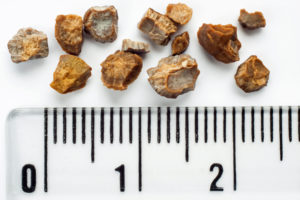Kidney stones are common for men and women.
Kidney stones are caused by a crystallization of various substances in your urine, usually calcium. They can be as small as a pebble, or as large as a walnut. It’s important to recognize symptoms in order to know when to seek help for kidney stones. When stones are small and able to pass on their own, an appointment with a urologist may be all that is needed. However, if they are large and will not pass, this may require emergency assistance.
Know when to seek help for kidney stones
You may not know that a kidney stone is present until it begins to pass through the urinary tract. When this happens, you may experience any of the following:
- Pain during urination.
- Red, pinkish, or brown colored urine (indicating blood in the urine).
- Urine that is foul-smelling or appears cloudy.
- Pain that feels like it’s hitting you in waves of varying intensity.
- Pain in your back and/or side(s).
- Nausea and/or vomiting.
- Fever, sometimes accompanied by chills.
Although these symptoms, in themselves, may not require immediate medical attention, it is important to schedule an appointment with your doctor as soon as possible.
In some cases, emergency care is an essential part of the healing process and for your safety. Seek immediate medical attention if you experience any of the following symptoms:
- Severe pain, vomiting, fever and/or chills.
- Visible blood in the urine.
- Difficulty urinating.
Kidney stone treatment options
There are several ways to treat kidney stones. Oftentimes, individuals who experience recurring kidney stones can take preventative measures such as:
- Drinking a lot of water to help flush the stone out of the body.
- Maintain a diet low in oxalate-rich foods to avoid further issues.
Once a small kidney stone is present, treatment can include:
- Drinking plenty of water to help flush the stone(s).
- Over-the-counter medications, such as acetaminophen or ibuprofen, may help minimize pain.
- For severe discomfort, prescription pain medication can be prescribed for relief.
- If the stone isn’t passing, other medications can be prescribed to assist in the process.
For larger kidney stones, procedures can be used to break up the stone(s) so that they can pass more easily. However, in some cases, surgical removal may be necessary.
None of the symptoms listed above should be ignored. Depending on severity, contact your doctor immediately if you experience pain or discomfort, and seek emergency medical attention if you suspect your case might need immediate intervention.
Sometimes a patient may not know when to seek help for kidney stones. If you have any questions or suspect you might have a kidney stone, please contact us at Urology Austin.
Related link

